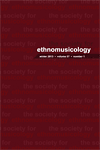
ETHNOMUSICOLOGY
Scope & Guideline
Connecting Cultures Through Sound
Introduction
Aims and Scopes
- Ethnographic Research:
The journal prioritizes ethnographic methodologies, encouraging detailed fieldwork that captures the lived experiences of musical practitioners within their cultural contexts. - Cultural Contextualization of Music:
Contributions often explore how music functions within specific cultural frameworks, revealing the ways that music shapes and is shaped by social norms, values, and identities. - Interdisciplinary Approaches:
The journal embraces interdisciplinary scholarship, inviting works that intersect ethnomusicology with fields such as anthropology, sociology, history, and cultural studies. - Political and Social Dimensions of Music:
Research frequently addresses the role of music in social movements, identity politics, and community building, highlighting music's power as a tool for resistance and empowerment. - Focus on Global and Local Practices:
The journal covers a wide array of musical traditions from around the world, spotlighting both local practices and global phenomena, thus fostering a comprehensive understanding of music's diversity.
Trending and Emerging
- Music and Social Justice:
There is an increasing emphasis on the role of music in social justice movements, exploring how musical practices can challenge oppression and foster community solidarity. - Digital Ethnomusicology:
The rise of digital platforms and technologies in music creation and dissemination is becoming a focal point, with researchers examining the implications of digital culture on musical practices. - Intercultural and Transnational Music Practices:
Emerging themes include the study of hybrid musical forms and transnational collaborations, reflecting globalization's impact on cultural exchange and musical innovation. - Environmental and Ecological Perspectives:
An increasing number of articles are addressing the relationship between music and ecological issues, highlighting how musical practices can reflect and respond to environmental challenges. - Gender and Sexuality in Music:
There is a growing body of work that critically examines the intersections of music with gender and sexuality, particularly the representation and agency of marginalized voices within musical traditions.
Declining or Waning
- Traditional Ethnomusicological Genres:
There seems to be a waning focus on traditional genres of ethnomusicology that primarily document and archive folk music traditions without engaging critically with contemporary issues. - Historical Musicology:
The intersection of historical musicology with ethnomusicology appears less prominent, indicating a shift towards contemporary music practices and their socio-political implications. - Conventional Music Analysis:
Papers that focus solely on formal analysis or theoretical perspectives detached from cultural contexts are becoming less frequent, suggesting a preference for holistic and ethnographically grounded approaches.
Similar Journals

ACTA MUSICOLOGICA
Elevating the Study of Music to New HeightsACTA MUSICOLOGICA, published by the International Musicological Society, stands as a pivotal journal within the field of Musicology, garnering attention from scholars and practitioners alike. With its ISSN 0001-6241, the journal serves as a vital platform for innovative research and discourse from 2002 to 2013 and again from 2016 to 2024, achieving a Q2 ranking in the 2023 Music category. Reflecting a commitment to excellence, it ranks #105 out of 180 in Arts and Humanities Music according to Scopus, placing it at the 41st percentile among its peers. Although not open access, ACTA MUSICOLOGICA ensures the dissemination of significant musical research, fostering scholarly exchange and exploration. This esteemed publication is essential for researchers, professionals, and students looking to deepen their understanding of musicology and contribute to ongoing academic conversations.
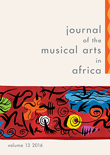
Journal of the Musical Arts in Africa
Unveiling the Richness of African SoundscapesThe Journal of the Musical Arts in Africa is a premier academic publication dedicated to exploring the rich and diverse musical traditions of the African continent. Published by ROUTLEDGE JOURNALS, TAYLOR & FRANCIS LTD, this journal offers a vital platform for researchers, professionals, and students in the field of musicology. With an ISSN of 1812-1004 and E-ISSN of 2070-626X, the journal has established itself as a significant contributor to the scholarly discourse surrounding African musical practices. With an impact factor reflecting its growing influence, the Journal of the Musical Arts in Africa is categorized in the Q3 quartile of music journals according to the latest metrics, placing it among an essential cadre of publications in the field. The journal invites original research articles, reviews, and critical essays that aim to expand the understanding of music as an integral part of African culture. It has been continuously publishing since 2004 and encompasses a wide range of topics, making it a must-read for anyone interested in the intersections of music, culture, and identity on the African continent. The journal stands as a testament to the vibrant musical heritage of Africa and encourages scholarly contributions that highlight the importance of music in reflecting and shaping societal values.
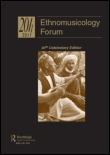
Ethnomusicology Forum
Unveiling the Rich Tapestry of Global Music TraditionsEthnomusicology Forum is a premier journal dedicated to the interdisciplinary study of music within its cultural contexts, published by Routledge Journals, Taylor & Francis Ltd. With an ISSN of 1741-1912 and an E-ISSN of 1741-1920, this journal plays a crucial role in advancing the field of ethnomusicology, offering insights into the diverse musical expressions found across the globe. As part of the academic landscape in the United Kingdom, the journal has established a commendable reputation, achieving Q2 rankings in both Anthropology and Music categories in 2023. Also noteworthy is its Scopus ranking, placing it in the 76th percentile in the Arts and Humanities category for Music and the 57th percentile in Social Sciences for Anthropology, reflecting its impact and scholarly importance. The Ethnomusicology Forum seeks to engage researchers, professionals, and students alike, providing a platform for innovative approaches to understanding music's role in society. Published annually and designated for a wide range of scholarly articles, the journal is essential for anyone looking to deepen their knowledge of music's cultural significance and its anthropological implications.

Musicology Today
Exploring the Soundscape of ScholarshipMusicology Today, published by SCIENDO, is a pivotal journal in the field of musicology, presenting a platform for scholars, researchers, and practitioners to disseminate their findings and engage with current trends in music research. With its ISSN 1734-1663 and E-ISSN 2353-5733, the journal aims to provide a comprehensive overview of various aspects of music, including theory, history, and ethnomusicology, fostering a multidisciplinary dialogue among its contributors. Located in Warsaw, Mazovia, Poland, this journal is not only committed to high academic standards but also to promoting open access to knowledge, thereby enhancing accessibility for a global audience. As it continues to bolster its reputation in the academic community, Musicology Today plays an essential role in shaping the future of music scholarship and invites the engagement of seasoned researchers and emerging voices alike.

Musica Oral del Sur
Unveiling the Past, Shaping the Future of Music StudiesMusica Oral del Sur is a prominent academic journal published by the Junta Andalucía through the Centro Documentación Musical Andalucía. With its ISSN 1138-8579 and E-ISSN 2445-0391, this pioneering publication has championed open access since 1995, providing a vital platform for scholars dedicated to the exploration of traditional and contemporary oral music practices in Southern Spain and beyond. The journal is essential for researchers, professionals, and students interested in musicology, ethnomusicology, and cultural studies, promoting scholarly discourse through a rich assortment of articles, reviews, and field research. Set in the vibrant cultural landscape of Granada, the journal encourages the fusion of theoretical insights with practical implications, making significant contributions to the understanding of oral musical traditions. By fostering accessible academic dialogue, Musica Oral del Sur plays an invaluable role in preserving and highlighting the heritage of Southern musical expressions while addressing contemporary issues in the field.

MUSIKFORSCHUNG
Fostering Critical Perspectives in MusicologyMUSIKFORSCHUNG is a distinguished journal in the field of music studies, published by NEUWERK-BUCH UND MUSIKALIENHANDLUNG in Germany. With its ISSN 0027-4801, the journal caters to scholars, practitioners, and students interested in the diverse realms of musicology. Although it is currently not an Open Access publication, MUSIKFORSCHUNG plays a vital role in the academic landscape by disseminating research and critical discourse on music from various historical and contemporary perspectives. The journal has established its worth in the academic community, being categorized in the Q4 quartile in Music for 2023 and holding a rank of #169 out of 180 in the Scopus Arts and Humanities Music category, placing it within the 6th percentile. With publication activities spanning from 2002 to 2013 and resuming in 2016 through to 2024, MUSIKFORSCHUNG continues to be a crucial resource for those dedicated to advancing music scholarship. Set in the cultural heart of Kassel, Germany, the journal invites contributions that foster an understanding of music's impact on society and culture.

Debates
Advancing Interdisciplinary Approaches to MusicDebates is a pioneering journal published by PROGRAMA POS-GRADUACAO MUSICA-PPGM, dedicated to advancing scholarly dialogue in the field of music studies. With an ISSN of 1414-7939 and an E-ISSN of 2359-1056, Debates serves as a vital platform for researchers, professionals, and students to explore contemporary issues, theoretical frameworks, and interdisciplinary approaches within musicology. Located in the vibrant cultural backdrop of Rio de Janeiro, Brazil, this journal aims to foster critical discourse and cross-cultural understanding in music. Although currently not indexed in major databases, the journal is committed to contributing valuable insights to the academic community, making it an essential resource for those seeking to deepen their knowledge and engage with the latest trends in music studies.
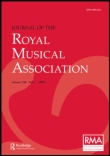
JOURNAL OF THE ROYAL MUSICAL ASSOCIATION
Celebrating the art and science of music.JOURNAL OF THE ROYAL MUSICAL ASSOCIATION, published by Cambridge University Press, stands as a significant repository for innovative research and scholarly discourse within the field of music studies. Recognized for its contributions to the understanding of musical practices, theory, and history, this esteemed journal offers a platform for academics and researchers to disseminate their findings to a broad audience. With an ISSN of 0269-0403 and E-ISSN of 1471-6933, the journal has maintained a notable presence since its inception, merging insights from both traditional and contemporary musicology. It currently occupies a Q4 ranking in Music within the Scopus database, reflecting its inclusion within the arts and humanities landscape. While the journal traditionally operates under subscription access, its continuing commitment to advancing music scholarship ensures that it remains an essential resource for students, scholars, and practitioners alike, fostering greater understanding and appreciation of musical artistry from 1987 to the current era.
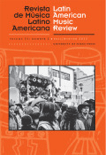
LATIN AMERICAN MUSIC REVIEW-REVISTA DE MUSICA LATINOAMERICANA
Fostering Critical Insights into Latin America's Musical LandscapeLATIN AMERICAN MUSIC REVIEW-REVISTA DE MUSICA LATINOAMERICANA stands as a prominent scholarly journal dedicated to the profound and diverse traditions of Latin American music. Published by University of Texas Press, this journal offers a platform for critical analysis, innovative research, and the dissemination of knowledge concerning the rich cultural heritage of Latin America. Although it currently does not provide open access options, the journal has made significant contributions to the field since its establishment, engaging a wide array of interdisciplinary perspectives. With coverage spanning from 2002 to 2009, the journal has been central to fostering scholarly dialogue and expanding the academic understanding of Latin American musicology, serving as an essential resource for researchers, professionals, and students alike. The journal is vital for those exploring the intersections of music, culture, and identity within the vibrant landscapes of Latin America.

MUSICAL TIMES
Illuminating the Intersection of Music and SocietyMUSICAL TIMES is a distinguished journal dedicated to the exploration and dissemination of scholarly works in the realm of music, serving as an essential resource for researchers, professionals, and students alike. Published by MUSICAL TIMES PUBLICATIONS LTD, this journal has built a robust reputation within the arts and humanities, specifically focusing on music studies, with an impactful reach indicated by its Scopus ranking at #73 out of 106 in the field. Though access to this journal is not open, its curated content, which spans various facets of musicology and contemporary music discourse, enriches the academic community by encouraging insightful discussions and critical analyses. With its historical roots tracing back to its inception, MUSICAL TIMES aims to foster a deeper understanding of music's cultural, social, and artistic dimensions, making it a valued publication for those engaged in the scholarly pursuit of music.